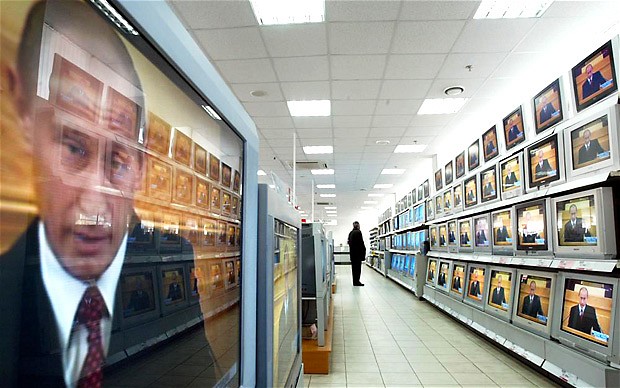In a recent report on the current Russian propaganda “netwar” being waged against non-Russia minds, the Center for Eastern Studies (OSW) found that Russia is actively carrying out organized campaigns to convince non-Russians that Russia is justified in its recent actions–particularly with regard to Crimea and greater Ukraine–but, the report found, the Russian info-war will likely not be successful outside of the Russian-speaking world where people are “less receptive to Russian disinformation.”
The report, entitled “The Anatomy of Russian Information Warfare; the Crimean Operation, a Case Study,” was written by the Centre for Eastern Studies’ Jolanta Darczewska.
“The Crimean operation has served as an occasion for Russia to demonstrate to the entire world the capabilities and the potential of information warfare,” the report states. Russia’s goal is to convince the world of a context for Russia actions in which Russia is participating in a struggle against an “Atlantic civilization led by the USA” which “intends to disassemble Russian statehood and gain global hegemony,” and in which Russia struggle for “a just multi-polar world, which defends tradition, conservative values and true liberty.”
Darzcewska did not think Russian propaganda could convince any but Russian speakers who are already invested in the Russian side of the conflict. “The Russian propaganda is rather incredible and easy to verify in the era of new technologies,” Darzcewska wrote. “Furthermore, the propagated ideas are not appealing.”
The audience Putin is successful with is already “receptive to Russian propaganda,” and the rest of the world is “less receptive to Russian disinformation.” Darzcewska’s phrased it, “Ideological newspeak based on disinformation falls on fertile socio-cultural ground in the East.”
Russia is attempting to promote its messages outside Russia, Darzcewska says, through “specialist media” such as Voice of Russia (VOR) and Russia Today (RT), official websites of Russian institutions such as the Ministry of Foreign Affairs, and also through “local opinion leaders.”
“The geopolitical doctrine,” Darzcewska wrote, “treats information as a dangerous weapon: it is cheap, it is a universal weapon, it has unlimited range, it is easily accessible and permeates all state borders without restrictions. The information and network struggle, as well as its extreme forms, such as information-psychological warfare and netwars, are means the state uses to achieve its goals.”
“Through information war, Darzcewska wrote, a state can also gain geopolitical advantage: “Geopolitics offers ideological grounds for information battles. In opposition to the ideology of liberalism, it promotes ‘a neo-conservative post-liberal power (…) struggling for a just multi-polar world, which defends tradition, conservative values and true liberty.’ The ‘Russian Eurasian civilization’ is set at contrast to the ‘Atlantic civilization led by the USA’ which allegedly intends to disassemble Russian statehood and gain global hegemony.” Darzcewska wrote that the crisis in Ukraine was presented in the context of the rivalry between the two civilizations.
In information war, specific techniques are used by the various practitioners, Darzcewska wrote. These “sociotechnical principles of successful propaganda” include “the principle of massive and long-lasting impact (the ‘orange plague’ and ‘Banderivtsy’ propaganda stero-types have been incessantly reiterated since 2003), the principle of desired information (Russians and Russian-speaking people expect that their rights should be protected, so they believed the manipulated information that the Russian language had been banned), the principle of emotional agitation n (bringing the recipients of the message to a condition in which they will act without much thought, even irrationally), the clarity principle (the message is simplified, uses black-and-white terms, and is full of loaded keywords, such as Russophobe), the principle of supposed obviousness (causing the propaganda thesis to be associated with created political myths: the Russian spring equals patriotism, Banderivtsy equals fascism, Maidan equals chaos, etc.).”
In her report, Darzcewska concluded, “Russian information warfare is set to continue since Putin’s new doctrine has crystallized. This doctrine is geopolitical, Eurasian, anti-liberal and oriented towards rivalry with the West and Russia’s dominance in Eurasia.”
By Day Blakely Donaldson

no-one denies russia resorts to propaganda. what sickens me to no end is how everyone conveniently forgets West has its own propaganda and agenda, too. these past few years I heard not one good word about Russia. I’m not blind and can see its faults. However this goes beyond: Russia is described in SUCH negative light, you’re brought to think it must be the worst country EVER. And more often than not, the language used is not neutral but tries to elicit hate and contempt. If you read a series of articles you’ll see that there are a set of words never missing: agressive, tzar, gay, rights, autocratic, repression ecc
Please, even when criticising, could you use respectful language and remember that nowhere is written that Democracy is the ONLY right path.